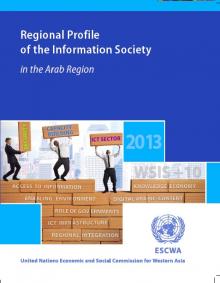
The Internet penetration rate in the Arab region registered a compound annual growth rate (CAGR) of 21.9 per cent during the period 2005-2012 which is higher than the world average of 12.4 per cent. The forte of ICT infrastructure in the region are dynamic mobile service markets which saw a notable penetration rate CAGR of 21.4 per cent between 2005 and 2012, higher than the global rate at 15.2 per cent. Additionally, as of mid 2013, all Arab countries except three had deployed 3G services. Noted improvements in cultural and linguistic diversity were seen in the region, especially in terms of the use of Arabic language on the Internet. The Arabic language came in the sixth place among the most used languages on the Internet, despite the fact that 3.6 per cent of the world online users utilize Arabic. These are the main findings highlighted in ESCWA’s report on the “2013 Regional Profile of the Information Society in the Arab Region” launched on June 9th 2014 during the WSIS+10 High Level Event, held in Geneva. The 13-chapter Report evaluates specific components of the information society, which align with the WSIS action lines such as ICT infrastructure, building confidence and security, enabling environment, cultural and linguistic diversity, electronic services and ICT applications. In addition, it covers additional areas of special interest to the Arab region such as the ICT sector. The report provides a comprehensive analysis, evaluation, suggestions, and recommendations covering all ESCWA member states, substantiated by case studies, success stories and best practices from the region. It also provides a regional and global comparative analysis between the Arab region and other regions. The report also addresses the challenges facing the realization of the information society and transition to a knowledge-based economy in the Arab region. Challenges include poor broadband penetration and affordability issues; lack of confidence and security in the use of ICTs; weak and sometimes incomplete legal and regulatory ICT framework; restricted access to information and privacy issues; and human skills gap in ICT-related fields. Such challenges, although differing among countries of the region, should be addressed in the coming years through the joint collaboration of all stakeholders including governments, the private sector, civil society and the academia. The report’s future outlook states that all ESCWA member states need to exert considerable efforts to reduce the digital divide despite the greater strides made by GCC countries when compared to non-GCC countries. Based on the analysis, the recommendations presented in the report urge Arab policy makers to adopt a framework for formulating policies and strategies beyond 2015 while taking into account the outcomes of the WSIS+10 review process and the post-2015 development agenda. The 2013 edition of the Regional Profile of the Information Society in the Arab Region is available at the ESCWA website through this link: http://www.escwa.un.org/information/pubaction.asp?PubID=1492





